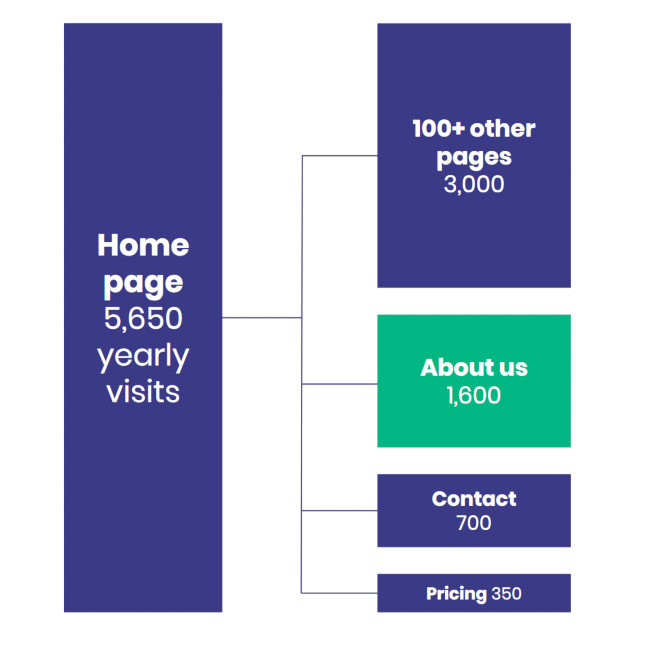Imagine you’re visiting a website for the first time. Maybe it’s one that your friend recommended, or you found it through a quick Google search.
Either way, you want to get a feel for the company before you start looking into the services they offer. Where would you look first for information?
The chances are, your first stop after landing on the homepage will be the ‘About us’ page.
It’s often overlooked, but this page is a key part of your potential clients’ experience of your website, and a great opportunity to make your firm stand out from the crowd.
You could think of it as a kind of online CV for your business, or even like a profile on a dating app. Either way, your ‘About us’ page needs to make that all-important first impression on the reader, encouraging them to find out more about you and ultimately to get in touch.
But who really pays attention to it?
To find out, let’s take a look at some example search analytics for a typical accountant’s website over the course of a year, with numbers rounded.

As you can see, among website visitors who arrived on the homepage, most people went on to look at the ‘About us’ page next. From there, visitors start to explore other areas of the website, including the team and contact pages.
It might sound obvious, but that first glance over the page really does count. The snap judgement that visitors make from your ‘About us’ page will probably influence what they think about your brand from that point on.
In psychology, this is called the Halo Effect – the idea that if you like one aspect of something, you’ll have a positive bias towards the rest of it. On the other hand, if you dislike part of something, you’re likely to feel negative towards the rest, regardless of its objective quality.
So the aim of your ‘About us’ page is to turn that first feeling among readers into one of trust.
But how can you go about doing this?
Tell your story
A successful ‘About us’ page should tell a compelling story that draws your readers in and gives them a reason to relate to your business.
It’s a chance for them to get to know the company behind the web page. In a few short sentences, you want to give them an understanding of who you are, what you do, and what makes you different from anyone else.
The key is to make this story genuine and avoid marketing jargon.
To return to the CV example, a recruiter reading about yet another “results-driven dynamic team player” is unlikely to stop and pay attention. Similarly, someone visiting your website won’t be interested in reading all the same claims they’ve seen elsewhere.
Instead, give your reader some real-life examples or case studies that show off your best qualities. What’s unique about the way you work?
Perhaps you have some impressive statistics on your staff retention rate, or the work you’ve done to support a local charity. Maybe you have an inspiring story to tell about how you helped a client or how your own firm has developed over time.
These kinds of examples are far more convincing than simply telling your reader how great you are, and they’ll allow what’s truly distinctive about your company culture to shine through.
Show your personality
A recent update to Google’s guidelines has given us some further insight into how this kind of personal touch can affect your website’s ranking.
Among the most important factors that Google uses to determine the quality of web pages, the guidelines list the “reputation of the website or creator of the main content”.
In other words, if the person – or people – behind the web page appear to have a good reputation and a high level of expertise in their field, this will be taken into account when determining search rankings.
This suggests you could use the ‘About us’ page to put the achievements of your firm’s partners in the spotlight. Some of the ways you could do this include:
- adding short biographies of the firm partners
- listing their professional accreditations and memberships
- linking to relevant social media profiles or blog posts.
As with any good SEO advice, this works not only because it meets Google’s standards, but because it’s helpful and relevant to your reader.
Give your website visitors an ‘About us’ page that’s well-written, engaging and informative, and they’ll have a good reason to find out more about you.

